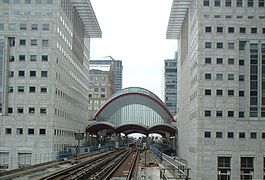Canary Wharf is a Docklands Light Railway (DLR) station in Canary Wharf in East London. Located next to One Canada Square and between two parts of a shopping centre (Cabot Place),[8] it serves the Canary Wharf office complex. Each of its three tracks feature platforms on both sides, allowing for easy interchanges and access to surrounding buildings. The station is sheltered by a distinctive elliptical glass roof.
| Canary Wharf | |
|---|---|
 Station viewed from the south | |
| Location | Canary Wharf |
| Local authority | Tower Hamlets |
| Managed by | Docklands Light Railway |
| Number of platforms | 6 (facing 3 tracks) |
| Accessible | Yes[1] |
| Fare zone | 2 |
| OSI | Canary Wharf Canary Wharf |
| DLR annual boardings and alightings | |
| 2019 | |
| 2020 | |
| 2021 | |
| 2022 | |
| 2023 | |
| Key dates | |
| November 1991 | Opened |
| Other information | |
| Coordinates | 51°30′18″N 0°01′15″W / 51.5051°N 0.0209°W |

The station is located on the DLR between Heron Quays station and West India Quay station. Canary Wharf is presently a terminus for the Stratford-Lewisham Line and services now only run to Lewisham in peak hours. The station is shown on the Tube map as being within walking distance of Canary Wharf Underground station;[9] however, Heron Quays DLR station is indicated as closer by around 50 metres. It is also within walking distance of Canary Wharf station on the Elizabeth line, although West India Quay DLR and Poplar DLR stations are considered to be closer.
History
editCanary Wharf station had been part of the original DLR plans, but when the system opened in August 1987 the station was not ready.[10] It was originally planned that the station would be similar to the original station at Heron Quays, with two small platforms either side of the tracks. It soon became apparent that the Canary Wharf development would produce demand well above the capacity of a simple station. On 17 July 1987 (over a month before the DLR opened to the public) a contract was awarded to GEC-Mowlem Railway Group to rebuild the station into the considerably more elaborate and spacious design that exists today. It was opened in November 1991.[10]
Services
editThe typical off-peak service in trains per hour from Canary Wharf is:[11]
Off-peak, the 12 tph service to and from Stratford terminates at Canary Wharf.
Additional services call at the station during the peak hours, increasing the service to up to 38 tph in each direction. This includes the service between Bank and Lewisham being increased to up to 22 tph in each direction, and the service to and from Stratford being increased to up to 16 tph, with up to 8 tph being extended beyond Canary Wharf to and from Lewisham.
| Preceding station | DLR | Following station | ||
|---|---|---|---|---|
| West India Quay |
Docklands Light Railway | Heron Quays towards Lewisham
| ||
| Westferry (eastbound West India Quay Bypass)
One-way operation |
Terminus |
Connections
editLondon Buses routes 135, 277, D3, D7, D8 and night routes N277 and N550 serve the station.[12]
See also
editReferences
edit- ^ "Step free Tube Guide" (PDF). Transport for London. April 2021. Archived (PDF) from the original on 15 May 2021.
- ^ "Out-of-Station Interchanges" (XLSX). Transport for London. 24 May 2022. Retrieved 5 June 2022.
- ^ "Station Usage Data" (XLSX). Usage Statistics for London Stations, 2019. Transport for London. 23 September 2020. Retrieved 9 January 2022.
- ^ "Station Usage Data" (XLSX). Usage Statistics for London Stations, 2020. Transport for London. 16 April 2021. Retrieved 9 January 2022.
- ^ "Station Usage Data" (XLSX). Usage Statistics for London Stations, 2021. Transport for London. 12 July 2022. Retrieved 7 September 2022.
- ^ "Station Usage Data" (XLSX). Usage Statistics for London Stations, 2022. Transport for London. 4 October 2023. Retrieved 20 October 2023.
- ^ "Station Usage Data" (XLSX). Usage Statistics for London Stations, 2023. Transport for London. 8 August 2024. Retrieved 16 September 2024.
- ^ Canary Wharf - Transport for London TfL official site Retrieved 3 September 2007
- ^ Tube map TfL official site Retrieved 3 September 2007
- ^ a b DLR history timeline TfL official site Retrieved 3 September 2007
- ^ "DLR train timetables". Transport for London. Retrieved 21 August 2023.
- ^ "Buses from Canary Wharf" (PDF). TfL. May 2022. Retrieved 20 May 2022.
External links
edit- Canary Wharf station on Docklands Light Railway's website
